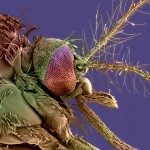Lien vers Pubmed [PMID] – 32456036
Lien DOI – E40410.3390/pathogens9050404
Pathogens 2020 May; 9(5):
The growing expansion of mosquito vectors has made mosquito-borne arboviral diseases a global threat to public health, and the lack of licensed vaccines and treatments highlight the urgent need for efficient mosquito vector control. Compared to genetically modified control strategies, the intracellular bacterium Wolbachia, endowing a pathogen-blocking phenotype, is considered an environmentally friendly strategy to replace the target population for controlling arboviral diseases. However, the incomplete knowledge regarding the pathogen-blocking mechanism weakens the reliability of a Wolbachia-based population replacement strategy. Wolbachia infections are also vulnerable to environmental factors, temperature, and host diet, affecting their densities in mosquitoes and thus the virus-blocking phenotype. Here, we review the properties of the Wolbachia strategy as an approach to control mosquito populations in comparison with genetically modified control methods. Both strategies tend to limit arbovirus infections but increase the risk of selecting arbovirus escape mutants, rendering these strategies less reliable.

